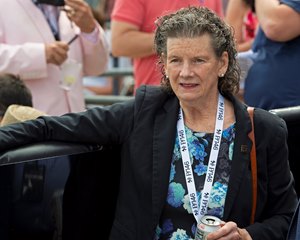Scollay: Otomax Problematic as Medina Spirit Treatment


One of three witnesses to testify Aug. 25 on the fourth day of the appeal hearing involving the disqualification of Medina Spirit from the 2021 Kentucky Derby Presented by Woodford Reserve (G1), longtime regulatory veterinarian Dr. Mary Scollay criticized a practicing veterinarian's practices in prescribing a betamethasone-containing ointment to treat Medina Spirit leading up to the race.
Speaking before hearing officer Clay Patrick, who is presiding in the Frankfort, Ky., hearing that is a part of the protocols for appeals of Kentucky Horse Racing Commission decisions, Scollay, executive director and chief operating officer of the Racing Medication and Testing Consortium, testified that it was "problematic" for the Zedan Racing Stables' Medina Spirit to be treated with the anti-fungal cream Otomax. Trainer Bob Baffert claims treatment of that cream to treat a skin condition on the colt's hindquarters led to the horse's Derby disqualification for a positive test for betamethasone, a corticosteroid
For a number of infractions that culminated with the Derby, Kentucky stewards fined Baffert $7,500 and suspended him for 90 days, dates he served this spring and summer after he failed to receive a stay pending his appeal.
Prior to joining the RMTC, Scollay served as equine medical director of the KHRC from 2008-19.
She testified that according to California Horse Racing Board treatment documents, Baffert's California-based veterinarian Dr. Vince Baker prescribed Otomax on April 9, 2021, and on April 19, 2021, as the colt readied for a start in the Derby at Churchill Downs in early May of that year.
Among other ingredients, Otomax contains betamethasone valerate, which Baffert's legal team asserts is not specifically prohibited by the KHRC, in contrast to betamethasone acetate, the type of betamethasone used in joint injections, the typical way horses receive the anti-inflammatory.
The KHRC maintains that the route of administration is irrelevant. Ambiguous language in KHRC rules is one of several notable areas Baffert's legal team is contesting with its appeal.
Otomax is not FDA-approved for use in horses. Horses can be treated with it off-label, but veterinarians are legally required to document in records and receive the client's consent in advance of dispensing or administrating off-label drugs, Scollay testified.
Records reported in California, where Baker prescribed the medication, noted limited details, she said. There was no indication of a fungal test or some other justification for treatment found in CHRB documents. Furthermore, no information was provided regarding size, volume dispensed, and instructions for treatment, she testified. The Veterinary Practice Act requires veterinarians to maintain and retain records, she continued.
She suggested if Medina Spirit had been experiencing a fungal issue, products containing strictly clotrimazole could have been chosen to treat the colt without the risks of the use of betamethasone, which is not permitted in a horse's system in Kentucky on race day. According to groom Rolando Cruz, he applied Otomax to Medina Spirit for a number of weeks last spring, up until the day before the Kentucky Derby.
Scollay said betamethasone is regulated because it is a "potent anti-inflammatory" with the potential to "mask injury, inflammation." Anti-inflammatories are regulated as "a welfare issue to make sure the horse's condition is not masked or misrepresented to the detriment of the horse," she testified.
Zedan Racing Stables' attorney Clark Brewster questioned Scollay's critique on cross-examination, noting she has never been a practicing racetrack veterinarian during her long career.
"Equine medicine is equine medicine," she replied at one stage.
Brewster further questioned her about betamethasone not being allowed at any level of detection, mentioning the prevalence of corticosteroids in many FDA-approved medications for either humans and animals, some with different or higher thresholds than betamethasone.
"I believe most violations are the result of error, not of intent," Scollay said under cross-examination.
Though she admitted betamethasone has therapeutic use, "I have often said therapeutically can be used non-therapeutically," she said.
Attorneys Luke Morgan and Jennifer Wolsing, representing the KHRC, have not conceded Otomax as the only potential route of betamethasone administration.
Earlier Thursday, they called Dr. Scott Stanley, a professor at the University of Kentucky and testing expert, who was critical of the findings of Dr. George Maylin, director of the New York Equine Drug Testing and Research Laboratory. After testing Medina Spirit's blood last year, Maylin concluded he found ingredients found in Otomax.
"I don't believe the data definitely concludes that," Stanley said of his review of Maylin's study.

Stanley said Maylin's lab "seemed like they targeted" betamethasone valerate more than betamethasone acetate. He later added that it could have cost between $30,000 to $60,000 to develop standard operating procedures for unique Otomax testing.
Under cross-examination, Stanley acknowledged that Maylin's laboratory is fully RMTC accredited and that he had not previously raised issues to the KHRC about testing procedures there. He testified to not having any evidence that Medina Spirit was injected with betamethasone.
Craig Robertson, Baffert's attorney, sought to discredit Stanley's testimony by noting that KHRC asked him to evaluate Maylin's study and mentioning that the University of Kentucky currently has an equine testing contract with the KHRC and Kentucky tracks.
Between those two witnesses, Brewster questioned Dr. Ben Moeller, equine chemistry section head and analytical chemist at the Kenneth L. Maddy Laboratory at the University of California, Davis, regarding its finding of betamethasone in Medina Spirit's split sample testing.
Speaking from California via video conference, Moeller did not accept Brewster's contention of a contaminant in a negative control during UC Davis testing. UC Davis updated its standard operating procedure for betamethasone the day it received Medina Spirit's split sample, a change to "our documentation to reflect the lower internal state of concentration," Moeller said.
The hearing continues Aug. 29 at 9 a.m. ET. After the hearing concludes, likely early next week, it is expected that Patrick will take a period of time before issuing a decision. The KHRC can then consider that decision as a recommendation. Further appeals would proceed into the court system.
